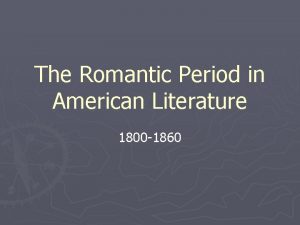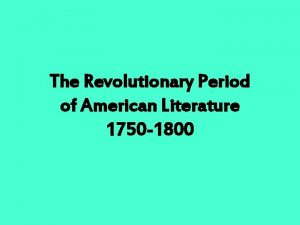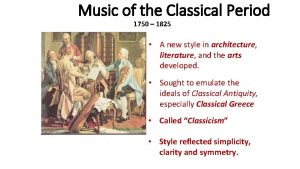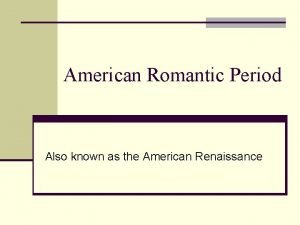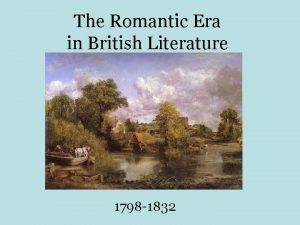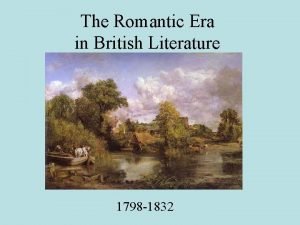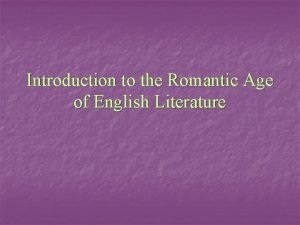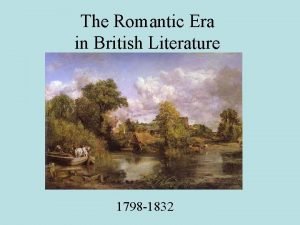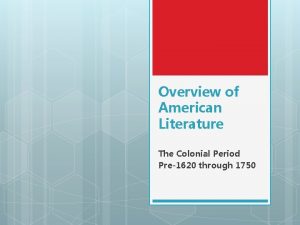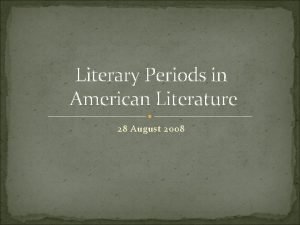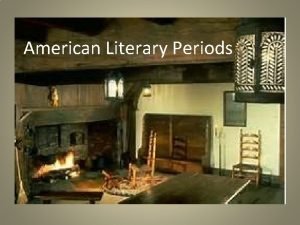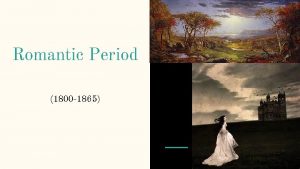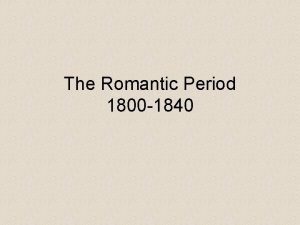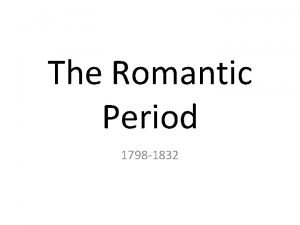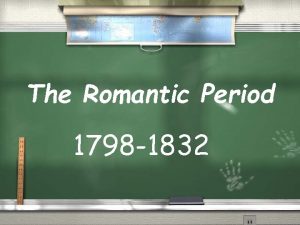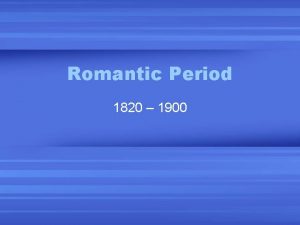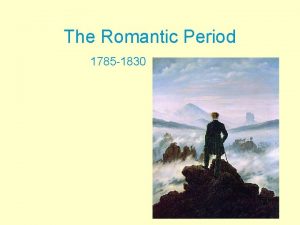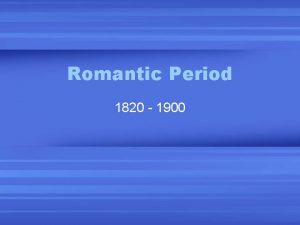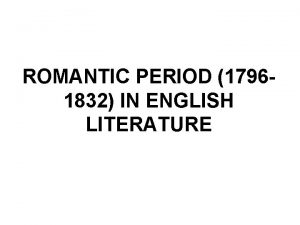Romantic Period 1800 1870 American Literature A Growing












- Slides: 12

Romantic Period (1800 -1870) American Literature

A Growing Nation n n 1800 -U. S consisted of 16 states clustered near the east coast 1803 -T. Jefferson signed Louisiana Purchase and doubled the nation’s size 1828 -Andrew Jackson (the People’s President); era of the common man; property requirements for voting eliminated Political reforms only for white men-not women or African Americans; “Indian removal” U. S. became a world power; War of 1812; “Monroe Doctrine”; Texas secession war with Mexico; Gold Rush


New Prosperity n n n Western expansion Transportation changing-Erie Canal; “iron horse” (1850) linked coast by 1869 Factories in Northeast Steel plow and reaper encouraged frontier settlement Telegraph led to almost instant communication Steamboats increased river travel

Winds of Change n n n New prosperity unleashed fierce competition Led to the creation of factories with child labor and unsafe working conditions 1840 - most women could not vote or file a lawsuit; decade of women’s rights promotion (Seneca Falls Convention) Slavery divided the nation; abolitionists and advocates of states’ rights 1861 - Civil War began

War is Coming! n n As war was inevitable, the burst of creativity began to subside Emerson, Thoreau – supported the North Whitman- worked in the war as a nurse; incorporated war into his later poems Oliver Wendell Holmes (“the last leaf upon the tree”)- the last of the Romantic poets

Comparison • • • Romanticism Focused on emotion Idealistic Change Faith in inner experience Youthful, innocent Looks to wisdom of the past Unspoiled nature Values inner feeling, intuition Depends on imagination Inspired by nature, supernatural Change, freedom, spontaneity • • • Rationalism Focused on the intellect Practical Stability Faith in science Adult, sophisticated Looks to the future Civilization, city life Values reason Depends on facts Inspired by reality Stability, harmony, tradition

Romantic Divisions ROMANTICISM n Romantics Washington Irving n n James Fenimore Cooper n n “The Legend of Sleepy Hollow” n Self-Reliance Henry David Thoreau n Civil Disobedience n n n Oliver Wendell Holmes Henry Wadsworth Longfellow Dark Romantics/Antitranscende ntalists Edgar Allan Poe n The Last of the Mohicans The Fireside Poets n n Transcendentalists Ralph Waldo Emerson n n “The Fall of the House of Usher” “The Raven” Nathaniel Hawthornne n n The Scarlet Letter “Dr. Heidegger’s Experiment”

Washington Irving (1783 -1859) n n n “Father of the American Short Story” First American writer to have an international reputation Wrote satirical essays (pen name: John Oldstyle); at 24 began publishing Salmagundi with humorous sketches and essays about N. Y. society Diedrich Knickerbocker- A History of New York From the Beginning of the World to the End of the Dutch Dynasty 1815 -1832 - lived in Europe; German folklore inspired “The Legend of Sleepy Hollow” and “Rip Van Winkle” “The Devil and Tom Walker”- timely because in New England the Puritan belief of devoting one’s life to God was being replaced by materialism and the desire for person gain

James Fenimore Cooper (1789 -1851) n n n “Father of the American Novel” Wrote The Leatherstocking Tales about Natty Bumpo- a man of excellent moral integrity who preferred Nature over civilization Established the pattern for countless future American heroes

The Romantic Hero n n n n Youth or youthful qualities. Innocence. Pure or noble purpose. Bravery and courage. Honor not based on society’s principles but on ‘higher’ moral standards. Love of nature; close knowledge of natural world. Avoidance of city life or civilization. Quest (search) for higher truth in the world of nature.

The Last of the Mohicans n n Setting: upstate NY (1757) during the French and Indian War. Plot: Traces the journey of a frontier hero named Natty Bumpo during the French and Indian War. He must defend his people and their land against the materialistic desires of the French and Indian forces who want to claim the Western frontier for their own commercial pursuits.
 Romantic period of american literature
Romantic period of american literature The romantic period in american literature
The romantic period in american literature American literature 1750 to 1800
American literature 1750 to 1800 Classical period 1750 to 1820 romantic period
Classical period 1750 to 1820 romantic period American romantic period
American romantic period Romantic period
Romantic period Romanticism notes
Romanticism notes Romanticism poetry characteristics
Romanticism poetry characteristics Romantic definition literature
Romantic definition literature British literature romantic period
British literature romantic period American literature colonial period
American literature colonial period American literature time periods
American literature time periods American colonial period literature
American colonial period literature

